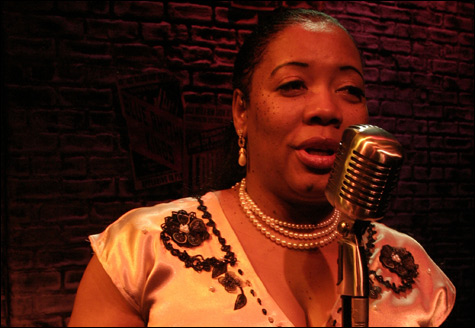
FROM THROW-AWAY TO STUNNING Jacqui Parker starts out the show draped in mink stole and bittersweet melancholy and ends it deeply immersed in drugs and the music. |
As Billie Holiday fell apart, so did her fragile if expressive voice. The opposite applies in Lady Day at Emerson’s Bar & Grill at the Lyric Stage Company of Boston (through April 24), where Jacqui Parker, starring in Lanie Robertson’s 1987 play about the jazz great at the end of the line, makes her way from throwaway to stunning. Characterized by its author as a “drama in the form of a cabaret act,” Lady Day precedes both the Donald Clarke and the Stuart Nicholson biographies of Holiday, and one presumes that it relies, as did the 1972 Diana Ross film, on Holiday’s own somewhat sketchy autobiography, Lady Sings the Blues. The script is pretty perfunctory, but the piece continues to turn up, primarily because it offers a talented African-American singer/actress the chance to put her stamp on the jazz standards most closely associated with Holiday, and to dip into the sad story of her life. Parker, whether starting out the show draped in mink stole and bittersweet melancholy or ending it deeply immersed in drugs and the music, is a performer who can get both jobs done — if not the impossible one of bringing Holiday, with her singular delivery, back to life.
The setting is the South Philadelphia dive of the title, an old haunt to which Holiday has returned to sing for her supper (or her syringe), just four months before her 1959 death, at age 44, from cirrhosis and heart failure. Sharing this latch-ditch stage with the chanteuse is pianist Jimmy Powers, whose assignments are to tickle the ivories and keep the diva from derailing before she’s made it through the iconic songs that are the management’s non-negotiable demands if she’s to get a paycheck. (The show often deploys a bassist or drummer as well, but the Lyric fields only musical director Chauncey Moore, laid-back and musically buttressing as worried but cajoling man-of-few-words Jimmy.)
Sliding playfully and later lurching among song, sly fragments of banter, musical background, and the sort of personal reminiscences that peter off into a shrugged “an’ all that shit,” Robertson’s Holiday rambles through a rough relation of a life that was itself rough, including as it did a ramshackle childhood, being raped at 10, brothel work, abusive relationships, the abject racism of the Jim Crow South, jail time, and an unintended but precipitous slip into a haze of alcohol and heroin. “Singing has always been the best part of livin’,” the Lady purrs, and you can understand why. At the Lyric, under Spiro Veloudos’s direction, you also understand how the music becomes a refuge. Even a blanket of pain (or of foggy defiance) can hold you tight.
The performance starts slowly, Parker’s cinched-cream-gowned Holiday all but dwarfed by the grubby white brick of Skip Curtiss’s tall, spare set. The few cabaret tables sit empty, except when Parker’s Holiday takes a load off to grab a glass of straight liquor, seldom rising without bringing it with her to the microphone. She makes her languid way through “I Wonder Where Our Love Has Gone” and “When a Woman Loves a Man” before picking up the tempo, if not her mood, for the Bessie Smith hit “Gimme a Pig Foot.” As for the slow start, that’s the Catch-22 built into Lady Day: the performance must somehow capture the magic of Holiday and, at this point in time, its coarsening and dissipation.